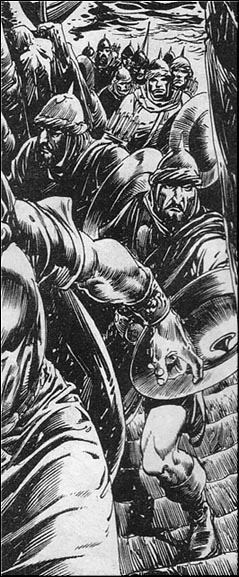
Turanian

"Her wide-eyed gaze was fixed in agonized intensity on the horseman who pushed through the reedy screen and dismounted before her. He was a tall man, slender, but hard as steel. From head to heel he was clad in light silvered mesh-mail that fitted his supple form like a glove. From under the dome-shaped, gold-chased helmet his brown eyes regarded her mockingly. (...) He laughed, and his laughter was like the purr of a sword sliding from a silken sheath." -- Robert E. Howard: "Shadows in the Moonlight"


Splendor of the East and Mistress of the Vilayet, Turan is fiercely proud of its Hyrkanian heritage. Perhaps the greatest empire ever to rise in the ancient world of Hyboria; Koth, Shem, Brythunia, and Zamora all pay tribute to the Empire of Turan. The chief gods of the Turanians are the Living Tarim and Erlik.
Turan is the wealthiest realm west of Khitai, with the possible exception of Vendhya. It has many ports along the eastern and western shores of the Vilayet and is mistress of the inland sea. Its capital, Aghrapur, is the most glorious and teeming city of the Age of Conan, extending from the sea to far inland. The huge, magnificent palace of the Emperor is called the Sunrise Court.
The Turanian marketplaces are always filled with "human trade goods" and one can purchase slaves from Brythunia, Zamora, Ophir, Kush, Shem, and Stygia. The Turanean people are a self assured lot, proud of their splendid nation, and supportive of their government's policies of imperialism.
They despise Kothians, viewing them as needlessly arrogant and insulting. On more than one occasion, Turani warriors have killed lone Kothians who insulted their honor.
Women in Turani society wear veils and are not allowed outside during the hours of darkness. They may only converse with men when approved by the head male of their family. All Turani women are married under arrangements made by their fathers. No other person may make such decisions. If a man is killed before his daughter reaches the proper age, the decision rests with the eldest son. All Turani men of wealth maintain large harems populated with as many foreign women of beauty as they can obtain.
Most Turani who do not live in the cities are shepherds and trade in animals rather than material objects. Despite this, some merchants do manage to gain significant wealth, particularly due to Turan's position on the trade routes between east and west.
Whenever two nomadic clans meet, each slaughters one of its animals to prepare a meal for the leader of the opposite clan. In this manner, they honor each other. Richer clans may also exchange gifts, although this usually only occurs when the two clans share roughly equal wealth. Otherwise, the richer clan gives a substantial gift to the poorer one.
Any traveler who wishes protection may seek to join a Turani clan. None who requests protection will ever be denied, but the traveler must surrender all of his weapons and follow all instructions from the clan’s leader.
The ambitious Turanians (often calling themselves Hyrkanians, after their ancestor race) made forays in all directions as they attempted to enlarge their empire. They had usurped most of the important caravan cities of the Eastern Desert by Conan's time, crowded the eastern frontier of Zamora, taken over the caravan route to the Far East with the assistance of their kinsmen, the Hyrkanians of the far eastern steppe, and even invaded Vendhya.
Their strongest monarch, Yezdigerd, fought successful battles with the armies of Hyperborea and Stygia. After the reign of Conan, the Hyrkanians of Turan will take advantage of the disintegrating Aquilonian Empire to absorb Zamora, Hyperborea, Brythunia, and Corinthia. In the South, they will fight with the Pictish invaders in Ophir, subjugating Shem completely, and overrunning Stygia. They will seriously overextend themselves by the time they march into Kush and will need withdraw to the north, settling down to a long series of wars against the Picts.
